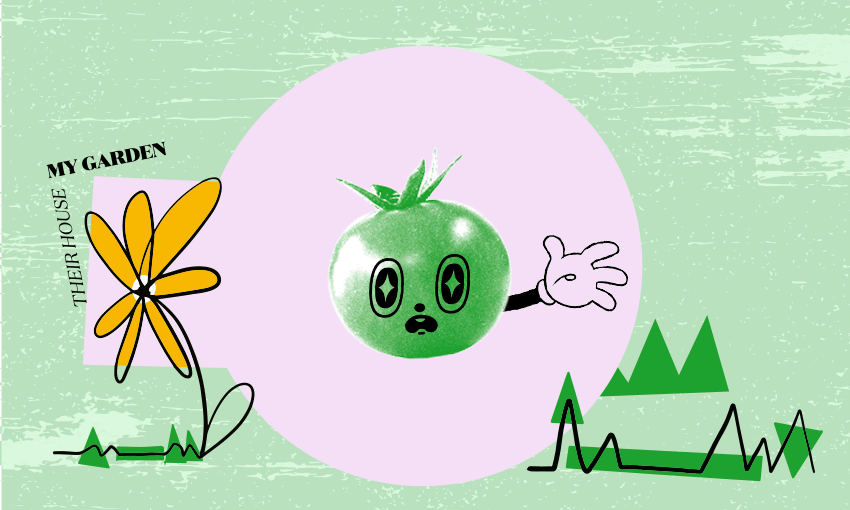This week on Their house, my garden, the inevitable fate of a tenancy arrives: leaving. How does one gracefully bid goodbye to a garden?
The tomatoes are hard, green, shiny globes. Ten droop off a frond, arranged in order of size. They are sweet-smelling perfection. A bean vine has understandably fallen in love with a tomato branch, and is clinging on as it forms delicate white buds. In front of them the zucchini is experiencing a mildew outbreak, but is still bearing flowers and fruit (“me,” I think, as a dermatitis flare creeps up my neck). Over on the side of the bed, silverbeet clusters are dense with juicy leaves.
It’s a good garden, as all gardens are, and has brought us lots of joy and food. Watching something you care for grow might be the best feeling in the world. But it’s time to say goodbye, and hope it can continue to flourish without us.
In the past that hasn’t gone so well. Gardens I’ve toiled and fussed over have been sizzled by summer sun without the reprieve of being watered; Kikuyu grass has claimed rich composted beds; and brick garden beds have even been disassembled as new occupants considered them too hard to mow around.
But something different has happened here. As our garden has grown, the neighbours who live in the flat above us have taken great interest. They moved in with a few flexi buckets of herbs, then planted some kale under the bay tree, then asked to occupy the other half of the old garden bed that the landlord unearthed. Before planting in it, they asked how our plants had grown so quickly. The soil, I told them, and pointed at the compost bin. It seemed they thought composting was only an eco-friendly way to deal with food waste, rather than a way to feed the garden.
The next weekend their side of the bed was heaped with sweet compost, and zucchini, tomato and cucumber seedlings. The gardens have grown up side by side, with two pairs of watchful parents. One pair (us) have gardened for a few years, and the other are first-time parents, often with questions and impressed by the simplest of answers and advice. When we gave our notice to the landlords, we asked if flat 4 could inherit our garden.
Many people have suggested not leaving the garden behind; to instead dig it up and relocate it. It’s tempting to never let go of the things you love, or to stay way too long at parties because leaving is a bit awkward, but the uncomfortable greater good here is not killing things (and going to bed). Perhaps if the plants were still tiny little pip-squeaks we could dig them up without damaging their roots, but the tomatoes are just about as tall as me, and their root systems could be stretching out further than a metre underground. It would be impossible to separate their roots from those of the other tomatoes, and of the zucchini and beans. The plants are no longer neat little individuals; they’re entwined together in a delicate mass which would suffer should I stab a spade through it.
Instead of a relocation, we took one last harvest. Yes, the scissors – along with my toothbrush, special dermatitis cream and jacket with the good pockets – are lost, their potential squandered in some mystery box currently in my mum’s garage, but luckily my partner has his handy little pocket knife which all too often knocks around the inside of the washing machine. It’s surprisingly sharp, given its spots of rust and hard life. The final harvest: one beetroot, three zucchinis and a handful of silverbeet leaves.
If I pretend to be as perfect as my tomatoes, I would be a liar. There were two plants we couldn’t let go of. The seeding spinach was uprooted so that we could use the big pots for their translocation. Then we approached the oregano and thyme, both of which have been thriving in a shady little corner, wielding our little plastic trowel. They were uprooted, pressed into the vacated pots, and drenched with the hose.
For two days, while we were between homes and slept in the cubby-hole bedroom of a brother’s boat, the herbs lived in my car boot. I parked under trees to alleviate the car’s hot-house tendencies, and gave the plants gallons of water.
Then when we arrived at our new, interim flat, the pots were dragged into the concrete yard. For a couple of days, they looked alive. Then things changed. The oregano’s leaves curled and darkened, while the thyme leaves dropped off, leaving a tangle of bristly, woody stems. I haven’t given up on them, but things aren’t looking good. Leaving them in their shady corner would have been better.
While I try to revive them, this column will take a three-week break. Then we will be back, with a new garden to make our own, and different gardeners to learn from. In the meantime, I wish you and your loved ones (plants) a happy and safe silly season.
Tip of the week: Never uproot plants, they will die.
Task of the week: Even though you will move one day, pour love into your garden. Love is not limited in supply. Like vegetable plants you harvest from, the more you give, the more you will have.



